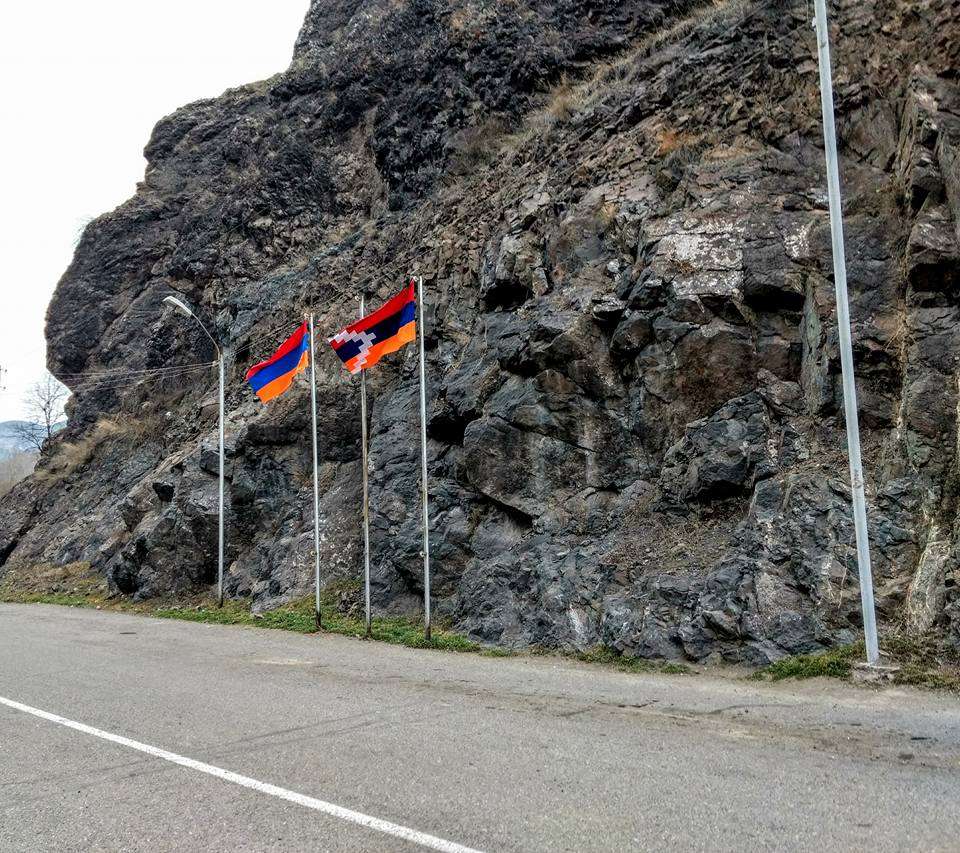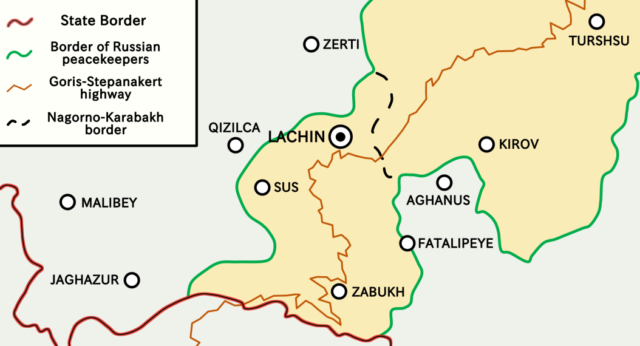
Geopolitical Report ISSN 2785-2598 Volume 33 Issue 8
Authors: Silvia Boltuc & Giuliano Bifolchi
The Republic of Artsakh, also known as Nagorno-Karabakh, has found itself embroiled in a dire humanitarian crisis because of the Azerbaijan blockade imposed since December 2022.
This blockade has had severe repercussions for the region’s residents, leading to acute shortages of essential supplies, including food, medicines, hygiene products, and even baby formula.
This report delves into the multifaceted geopolitical dimensions of this crisis, analysing the motivations behind the blockade, its implications, and the broader regional dynamics that have contributed to this distressing situation.
Azerbaijan Blockade: Background Information
In December 2022, claiming some environmental issues, some Azerbaijani activists started the blockade of the Lachin Corridor, which connects Armenia to the Republic of Artsakh. The situation escalated when Azerbaijan established a new checkpoint in April 2023, subsequently culminating in a complete road closure on June 14th, 2023, following clashes between Azerbaijani and Armenian guards on the Hakari Bridge.
As a result of this blockade, Artsakh has been plunged into a state of dire scarcity. The stark realities on the ground include empty supermarkets, halted public transportation due to fuel shortages, and a dearth of electricity and water in numerous districts.
Amid these harsh circumstances, the residents of Artsakh point to what the Azerbaijan blockade as a means to force submission, employing hunger as a weapon to achieve its ends. In response, Azerbaijan has vehemently denied imposing a blockade, instead attributing its actions to environmental concerns and dismissing Armenia’s claims as baseless.
Residents of Artsakh consider Azerbaijan’s offer to supply Artsakh through an alternative route, specifically via the Azerbaijani city of Aghdam, as an attempt to integrate the republic into its territory rather than addressing the dire humanitarian crisis at hand. The local populace’s rejection of aid from Azerbaijan, even under such dire circumstances, underscores the deep-seated mistrust between the two parties. This sentiment reflects the complex historical and geopolitical factors at play in the region.
Artsakh: Geopolitical Implications and Scenario

The implications of Azerbaijan’s blockade extend beyond the immediate humanitarian crisis. The strategy of enforcing a blockade while using environmental concerns as a pretext establishes a risky precedent for other countries to utilise similar tactics in the future. This strategy could coerce a target nation into accepting unfavourable conditions, threatening the principles of sovereignty and self-determination.
Moreover, the Azerbaijani blockade underscores the Baku regime’s confidence in its ability to create a humanitarian crisis to pressure governments in Yerevan and Stepanakert to accept its requests without international intervention.
To contextualise this crisis, it is imperative to consider the historical backdrop of the Nagorno-Karabakh conflict. Originating in the 1980s and intensifying after the dissolution of the Soviet Union, this dispute saw the declaration of independence of the Republic of Artsakh, which led to the first Nagorno-Karabakh Conflict (1992-1994), won by the Armenians.
Despite efforts by the OSCE Minsk Group to find a diplomatic solution, the conflict resurfaced in 2020, resulting in the second Nagorno-Karabakh Conflict. Baku’s victory in this conflict, epitomised by the capture of the city of Shushi, bolstered Azerbaijani nationalism and self-assuredness.
In the broader geopolitical context, Azerbaijan’s role as a strategic partner to the European Union cannot be understated, particularly considering the EU’s efforts to diversify its energy sources following the Ukraine conflict.
Consequently, President Ilham Aliyev enjoys a privileged status (thanks also to the Azerbaijani lobby and the well-known ‘caviar diplomacy’), and this special relationship between Baku and Brussels influences the EU’s approach to the crisis. The stark humanitarian crisis juxtaposed with the EU’s inaction highlights Brussels’ double-standard policy.
The conflict surrounding the blockade raises profound ethical questions regarding the balance between the right to territorial integrity and the right to life and existence. While the European Union upholds Azerbaijan’s territorial claim over Artsakh, the crisis prompts reflection on whether territorial integrity should supersede fundamental human rights, especially when the situation has been characterised as a potential genocide.
Examining the broader regional dynamics, the events in the South Caucasus since the 2020 Nagorno-Karabakh conflict reveal shifts in influence. The partnership between Azerbaijan and Turkey has grown more potent, while Russia’s involvement appears somewhat challenged.
Although Russia mediated for the cease-fire reached between Armenia and Azerbaijan in November 2020 and deployed peacekeepers to prevent further escalation, some Armenians perceive a sense of abandonment because of Russia’s relatively passive role. This sentiment is encapsulated by recent events where Russian peacekeepers transferred citizens from Artsakh to Armenia for the first time since June 2023.
Conclusion
In summary, the humanitarian crisis that has unfolded because of the Azerbaijani blockade in Artsakh serves as a poignant reminder of the intricate and interwoven tapestry of geopolitical dynamics that characterise this region.
This crisis has not only brought into sharp focus the challenges inherent in striking a delicate equilibrium between the preservation of territorial integrity and the safeguarding of fundamental human rights but has also laid bare the intricate subtleties and complexities that define the intricate relationship between the European Union and Azerbaijan.
The landscape of regional influence and power dynamics has undergone a sort of transformation, casting a spotlight on the multifaceted nature of this dire predicament. The conspicuous involvement of Turkey and Russia, both of which have played pivotal roles in shaping the course of events in the South Caucasus, adds yet another layer of intricacy to an already intricate situation.
In the wake of the 2020 Nagorno-Karabakh conflict, the emergence of an increasingly potent partnership between Azerbaijan and Turkey, coupled with a perceptible shift in the degree of Russia’s engagement due to the Ukraine conflict, serves to further convolute the crisis, engendering a scenario that demands the most astute diplomatic deliberations and concerted international efforts.
In this difficult landscape, where geopolitical manoeuvrings are entwined with human suffering and existential questions, it becomes incumbent upon the global community to not only acknowledge the urgency and gravity of the circumstances at hand but also to embrace an approach that places paramount importance on the well-being and inherent rights of the beleaguered population in Artsakh.
As the world grapples with the multifarious dimensions that this crisis encompasses, a steadfast commitment to forging diplomatic pathways and engendering substantive dialogue becomes imperative. The delicate task of reconciling the complexities of political allegiances, territorial integrity, and the irrefutable rights of individuals should be undertaken with the utmost earnestness, reflecting the core values of humanity and the principles of justice on the global stage.
Do you like SpecialEurasia reports and analyses? Has our groundbreaking research empowered you or your team? Now is your chance to be a part of our mission! Join us in advancing independent reporting and unlocking the secrets of Eurasia’s complex geopolitical landscape. Whether through a one-time contribution or a monthly/yearly donation, your support will fuel our relentless pursuit of knowledge and understanding. Together, let’s pave the way for a brighter future. DONATE NOW and secure your place in shaping the geopolitical narrative.
